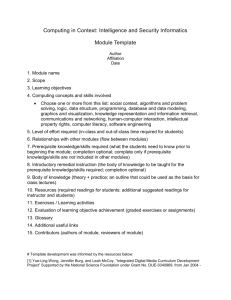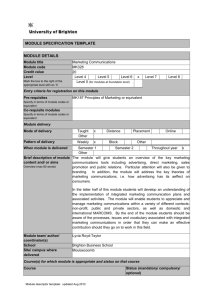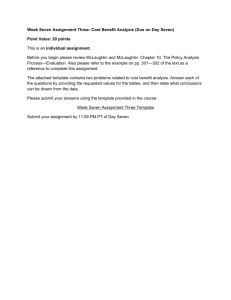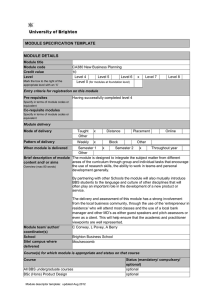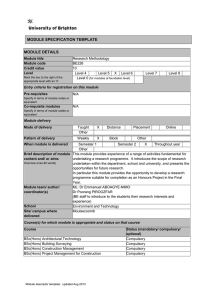BE252 251115
advertisement
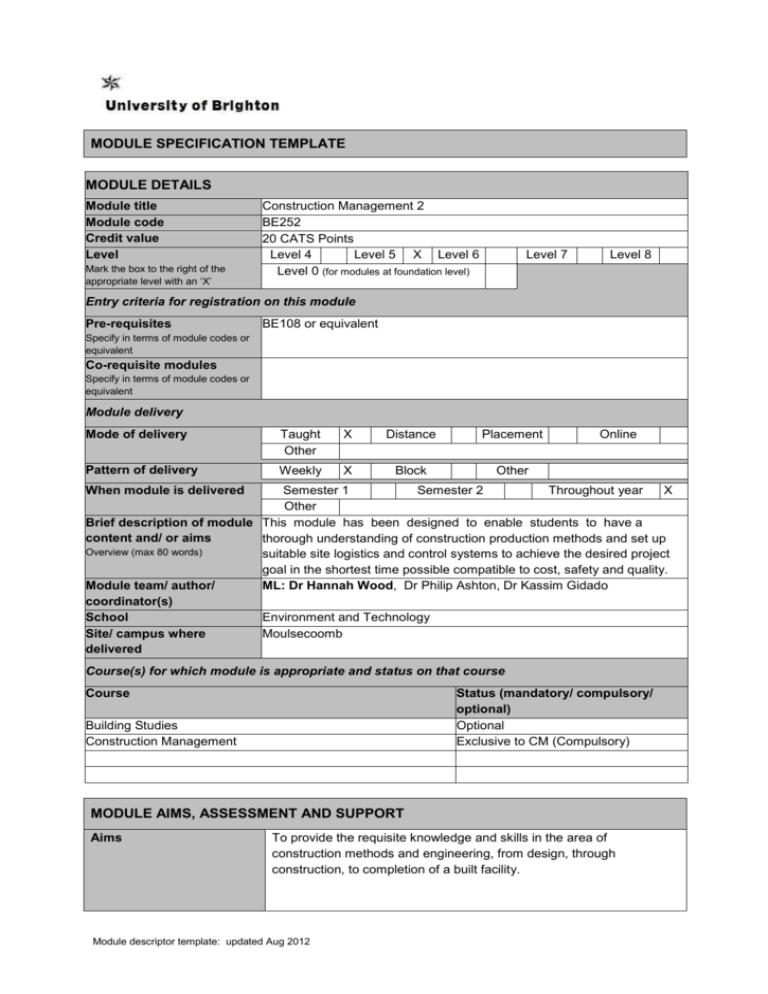
MODULE SPECIFICATION TEMPLATE MODULE DETAILS Module title Module code Credit value Level Mark the box to the right of the appropriate level with an ‘X’ Construction Management 2 BE252 20 CATS Points Level 4 Level 5 X Level 6 Level 0 (for modules at foundation level) Level 7 Level 8 Entry criteria for registration on this module Pre-requisites BE108 or equivalent Specify in terms of module codes or equivalent Co-requisite modules Specify in terms of module codes or equivalent Module delivery Mode of delivery Taught Other X Distance Placement Pattern of delivery Weekly X Block Other Online When module is delivered Semester 1 Semester 2 Throughout year X Other Brief description of module This module has been designed to enable students to have a content and/ or aims thorough understanding of construction production methods and set up Overview (max 80 words) suitable site logistics and control systems to achieve the desired project goal in the shortest time possible compatible to cost, safety and quality. Module team/ author/ ML: Dr Hannah Wood, Dr Philip Ashton, Dr Kassim Gidado coordinator(s) School Environment and Technology Site/ campus where Moulsecoomb delivered Course(s) for which module is appropriate and status on that course Course Status (mandatory/ compulsory/ optional) Optional Exclusive to CM (Compulsory) Building Studies Construction Management MODULE AIMS, ASSESSMENT AND SUPPORT Aims To provide the requisite knowledge and skills in the area of construction methods and engineering, from design, through construction, to completion of a built facility. Module descriptor template: updated Aug 2012 Learning outcomes By the end of the module, students will be able to: 1. understand the interaction of design and construction and be aware of the inherent complexity and uncertainty of processes and practices involved in construction; 2. transform design information into production mode by conducting construction method analyses to produce an optimum method statement that can transform the designer's information into a three dimensional reality; 3. set up the necessary logistics and site organisational structure for the implementation of the project on site; 4. work in teams and prepare oral, written and display presentations Content The module will address issues such as: Mechanical plant & equipment (Selection & Uses) Site setup and layout and Site organisational factors; Vertical & horizontal site transportation; Types of method statements; Health and Safety plan & implementation in construction processes; Excavation and earthworks; Foundation types:selection, and protection; Shoring and Underpining; Ground water control and Geotechnical processes Learning support Indicative Reading List: Construction management strategies: a theory of construction management - Radosavljevic, Milan, Bennett, John c2012 Contractual procedures in the construction industry - Ashworth, A. 2006 Construction methods and planning - Illingworth, J. R. 2000 Project management - Lock, Dennis c2007 Construction planning, equipment, and methods - Peurifoy, R. L., Schexnayder, Cliff J., Shapira, Aviad c2006 Foundation design and construction - Tomlinson, M. J., Boorman, R. 2001 Planning and controlling construction projects: the best laid plans- Mawdesley, Michael, Askew, William, O'Reilly, M. P., Chartered Institute of Building c1997 Supporting texts Managing construction projects: an information processing approach Winch, Graham 2002 Procurement systems: a cross-industry project management perspective - Walker, Derek H. T., Rowlinson, Stephen M. 2008 CPM in construction management - O'Brien, James Jerome, Plotnick, Fredric L. 2009 Planning, measurement, and control for building - Cooke, Robert 2009 Mawdesley M, Askew W, O'Reilly M (1997), Planning and Controlling Construction Projects, the Best Laid Plans. Longman. Winch, G.M. (2002), Managing Construction Projects. Blackwell Publishing, London Teaching and learning activities Details of teaching and learning activities A series of key-note lectures with tutorial support guiding a student centred project. Students will be working in small groups to develop their collective response to the problems posed and then they will be expected to produce an individual response as the final submission. Double Module ~ 200 study hours ~ incl. Lectures, Activity Visits, Coursework, Self Study support incl. tutorials. Allocation of study hours (indicative) Module descriptor template: updated Aug 2012 Study hours Where 10 credits = 100 learning hours SCHEDULED This is an indication of the number of hours students can expect to spend in scheduled teaching activities including lectures, seminars, tutorials, project supervision, demonstrations, practical classes and workshops, supervised time in workshops/ studios, fieldwork, external visits, and work-based learning. 100 GUIDED INDEPENDENT STUDY All students are expected to undertake guided independent study which includes wider reading/ practice, follow-up work, the completion of assessment tasks, and revisions. 100 PLACEMENT The placement is a specific type of learning away from the University that is not work-based learning. It includes study that occurs overseas. TOTAL STUDY HOURS 200 Assessment tasks Details of assessment for this module Coursework (75%) Code BE252/1: Site & Construction Method Development. (LO1, LO3, LO4) Examination (25%) Code BE252/1: (LO1, LO2) Types of assessment task1 % weighting Indicative list of summative assessment tasks which lead to the award of credit or which are required for progression. (or indicate if component is pass/fail) WRITTEN Written exam 25 COURSEWORK Written assignment/ essay, report, dissertation, portfolio, project output, set exercise 75 PRACTICAL Oral assessment and presentation, practical skills assessment, set exercise EXAMINATION INFORMATION Area examination board Built Environment and Civil Engineering Refer to Faculty Office for guidance in completing the following sections External examiners Name Position and institution Date appointed Date tenure ends Dr Joseph Gunning 1 Set exercises, which assess the application of knowledge or analytical, problem-solving or evaluative skills, are included under the type of assessment most appropriate to the particular task. Module descriptor template: updated Aug 2012 QUALITY ASSURANCE Date of first approval 2006 Only complete where this is not the first version Date of last revision Only complete where this is not the first version Date of approval for this version April 2011 Version number 6 Modules replaced Specify codes of modules for which this is a replacement Available as free-standing module? Module descriptor template: updated Aug 2012 Yes No

